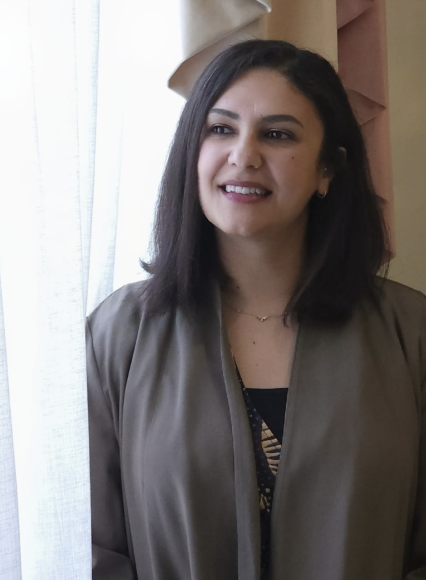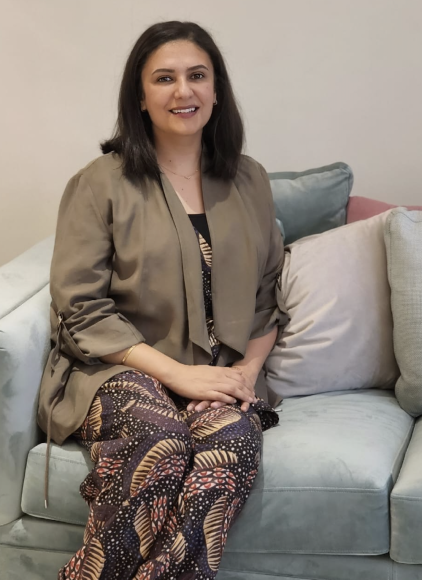Dr. Nouf Al-Rashid is a clinical psychologist with expertise in providing psychotherapy to children, adolescents, adults, and their families.
After completing her undergraduate degree at the University of Kent and her master’s degree at Kings College London she pursued a doctorate in clinical psychology at the Wright Institute.
Having worked between the United States and Saudi Arabia, Dr. Nouf Al-Rashid is a firm advocate of mental wellbeing and has been providing services both in English and Arabic to help individuals and their families cope with stressors, traumatic experiences, and enhancing their sense of self.
Dr Nouf, how would you describe a typical workday of a clinical psychologist?
My day looks very different since coming out of the COVID-19 lockdown and getting to work with children and families in person again. One of the exciting parts about being a clinical psychologist is how my work involves different aspects and opportunities. For example, in my role as a clinician I am supporting a family through a particular crisis, or helping a child learn to identify and manage their emotions, or helping a teenager process their trauma history. Having just recently moved back to Jeddah and taken on the position of clinical director at ACT Center, my day also involves supervising my clinical staff, providing additional trainings, and managing the department. All in all, my job varies from day to day depending on what my clients need or what is needed at the center.
As challenging as your career seems to be, what is your source of gratitude?
While there are aspects of this work that can be emotionally draining it is also a source of joy and satisfaction for me as well, which makes it feel less challenging. This is one of the things that I appreciate about my work. An important source of gratitude are my clients. When I see a family that I’ve worked with get through a tough time, or help a child understand why their body is reacting a certain way, or even why they can’t control their anger effectively it is very rewarding, and I feel grateful for the work that I do. I’m also grateful for my network of colleagues that I can tap into when I have some complex situations and of course my family and friends who support me.
Why do you think it took so much time for individuals to realize the significance of mental wellbeing?
There is an incredible amount of stigma related to mental health everywhere, not just in the Middle East. Before moving to Jeddah, I practiced in the US for many years, and I have seen how mental health stigma is everywhere. I think in many ways, mental health is viewed as being separate from physical health, and therefore less important. Which is not true. So much about what we think and how we feel strongly impacts our physical health. Stigma surrounding mental health also has to do with a lack of awareness and education. Many individuals don’t have the awareness or understanding about mental wellbeing, as it has been viewed negatively for many years. I think most people are confused about what it means to have good mental wellbeing. On a basic level, having improved mental wellbeing increases your ability to cope with life’s stressors, enhances your performance, allows you to foster deeper connections, and decreases burnout. Again, with the lack of awareness, most people don’t make that connection and aren’t aware of it.
And as a psychologist, how do you take care of your own mental health after being surrounded by emotionally charged situations throughout the day?
I work hard to make sure I’m not as effected by my clients’ issues by maintaining my own mental wellness. So many of my own clients and their families are going through a lot. They experience stressors or are traumatized, which over time wears on you as a psychologist. To do this, I rely a lot on my professional community and maintain a collaborative environment at work. It really helps to have colleagues I can talk to and consult with. Part of my professional training also helped me to set better work-life boundaries so that I don’t easily feel so overwhelmed. I also use many of the strategies I teach my clients to use, such as focusing on my body and grounding myself. As an example, if I am working with a client with a history of trauma, I am able to help ground that client in the moment as they are processing this trauma in session, which in turn reminds me to also pay attention to my body.
So, what advice would you give to parents with children suffering from trauma or mental illness?
The advice I would give is that you’re not alone, even if you feel that way. I would also encourage individuals not to isolate. Sometimes it feels like things will get worse before they get better but with the right help you can get support through this tough time. When your child is struggling with anything related to their mental health you feel responsible and carry that guilt with you. Children are resilient and you bringing them in to seek therapy is a huge step forward. Not only will the therapy help your child, but it will also ease the burden you are carrying and help you understand how to best support your child through this tough time. What you can also do is begin to understand where your child is developmentally and whether their behavior is atypical, which is something that a trained therapist can help you understand. I provide this support when I work with parents, because many parents are unsure if the behaviors their child is displaying is “normal.” In general, however, if you notice a sudden change in a child’s behavior or their ability to manage their emotional reactions, it would be helpful to seek out professional mental health services.
In the Middle East, people are often afraid to be stigmatized for visiting a psychologist; what would you say to individuals who resist professional aid?
I think there’s shame, worry, and other complicated feelings. Those feelings might keep you from getting the help you need and that’s normal and expected. The first step is usually the hardest which is making a call and booking an appointment. After that all you need to do is show up and we will guide you through every step. Even in my work every day, I have to reassure clients and parents that what they go through is hard and that hesitancy is normal. I noticed that that reassurance really helps a lot and they really appreciate the support once they get in the door. One of the first clients I saw after moving back to Jeddah, highlighted this issue for me pretty well. They wanted to come in after hours because they were so worried someone they knew might see them and think they were “crazy”. Part of our work together was helping them understand more about how these misconceptions really impacted their own mental and emotional wellbeing. After working together for a few weeks, they were able to understand more about therapy and now they attend sessions during the busiest time of day.
And how has the COVID-19 pandemic affected the overall mental wellbeing of people?
The pandemic has really impacted many people’s mental health both in the Middle East and in many other countries. It has caused more incidents of depression, anxiety, stress, and social isolation among both adults and children. Our way of life has shifted, which has impacted how we connect, manage stress, and regulate our emotions. As an example, we are seeing more children struggling to stay focused in school, make social connections, and an increase in separation anxiety. Among adults we are seeing more depression, anxiety, and inability to cope with life’s stressors.
Besides professional support, what are some daily things we can do to improve our mental wellbeing on a personal level?
There is so much we can all do. I think most of us think we need to do many different things for extended periods of time in order for it to have an impact on our mental wellbeing; however, this isn’t true. All you need is one thing you do for yourself. For example, I love to dive into a good novel and lose myself in a different world. I’m also very lucky to live so close to the sea and love going to the beach to unwind. Any daily activity that can help you practice more acceptance and compassion towards your body and your mind will help improve your mental wellbeing.
Text by Victor Gee






